Ward A.W. The Cambridge History of British Foreign Policy. 1783-1919. Volume 3
Подождите немного. Документ загружается.

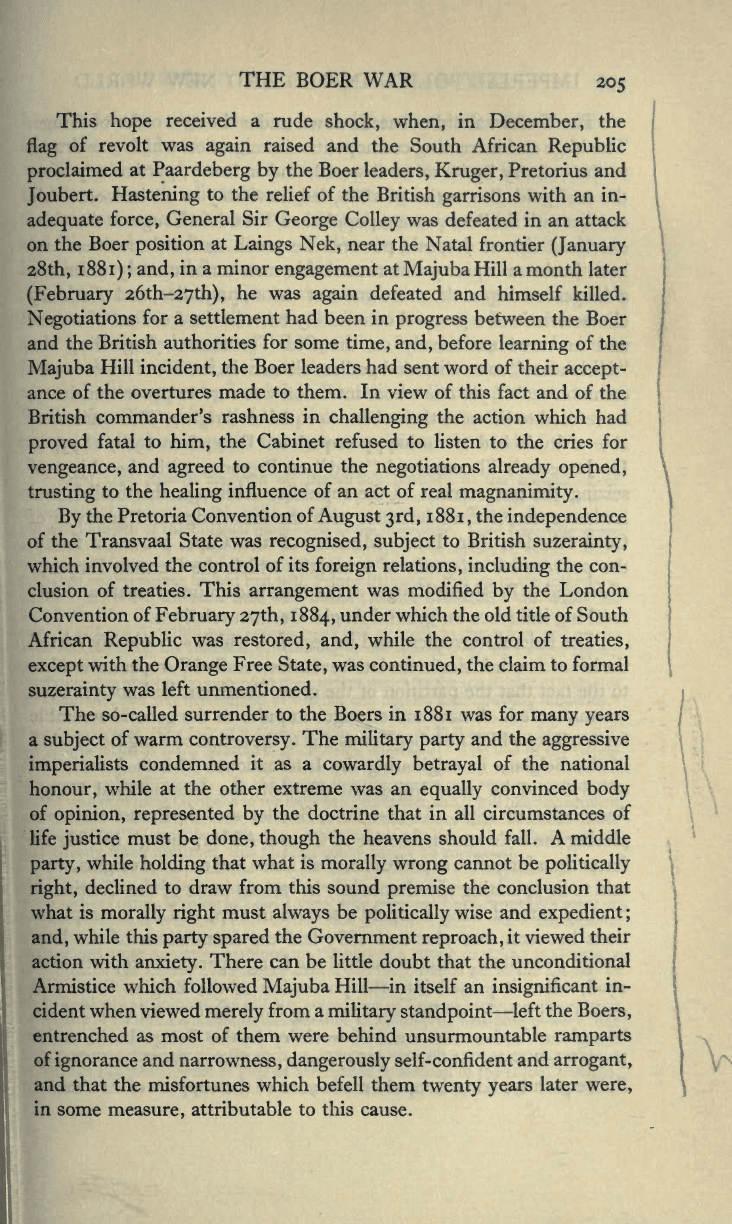
THE
BOER WAR
205
This
hope
received
a
rude
shock, when,
in
December,
the
flag
of
revolt
was
again
raised
and
the South African
Republic
proclaimed
at
Paardeberg
by
the
Boer
leaders,
Kruger,
Pretorius
and
Joubert. Hastening
to
the
relief of
the British
garrisons
with
an in-
adequate
force,
General Sir
George
Colley
was
defeated
in
an
attack
on
the
Boer
position
at
Laings
Nek,
near
the
Natal frontier
(January
28th,
1
881)
;
and,
in a
minor
engagement
at
Majuba
Hill
a
month later
(February
26th-27th),
he was
again
defeated and
himself killed.
Negotiations
for
a settlement had
been in
progress
between
the
Boer
and
the
British authorities
for
some
time,
and,
before
learning
of
the
Majuba
Hill
incident,
the Boer leaders had
sent
word of
their
accept-
ance
of
the overtures
made to
them.
In
view of
this
fact and of
the
British
commander's
rashness
in
challenging
the action
which had
proved
fatal to
him,
the Cabinet
refused to
listen to
the cries
for
vengeance,
and
agreed
to
continue
the
negotiations
already
opened,
trusting
to the
healing
influence
of an act of
real
magnanimity.
By
the Pretoria
Convention
of
August
3rd,
1881
,
the
independence
of the
Transvaal
State was
recognised,
subject
to
British
suzerainty,
which
involved
the control of
its
foreign
relations,
including
the con-
clusion
of treaties. This
arrangement
was modified
by
the
London
Convention
of
February
27th,
1884,
under
which
the old title of South
African
Republic
was
restored,
and,
while the control of
treaties,
except
with the
Orange
Free
State,
was
continued,
the claim
to formal
suzerainty
was
left unmentioned.
The
so-called
surrender to
the Boers
in 1881
was for
many years
a
subject
of warm
controversy.
The
military party
and
the
aggressive
imperialists
condemned
it as
a
cowardly betrayal
of the
national
honour,
while
at the
other
extreme
was an
equally
convinced
body
of
opinion,
represented
by
the
doctrine
that in
all circumstances
of
life
justice
must be
done,
though
the
heavens
should fall.
A middle
party,
while
holding
that what is
morally
wrong
cannot be
politically
right,
declined
to draw from this sound
premise
the
conclusion
that
what is
morally right
must
always
be
politically
wise
and
expedient
;
and,
while
this
party
spared
the Government
reproach,
it viewed
their
action
with
anxiety.
There
can
be little
doubt that the
unconditional
Armistice which followed
Majuba
Hill
—
in
itself
an
insignificant
in-
cident when viewed
merely
from
a
military
standpoint
—
left
the
Boers,
entrenched as most of
them
were behind
unsurmountable
ramparts
of
ignorance
and
narrowness,
dangerously
self-confident
and
arrogant,
and that
the
misfortunes
which befell them
twenty years
later
were,
in
some
measure,
attributable to
this
cause.
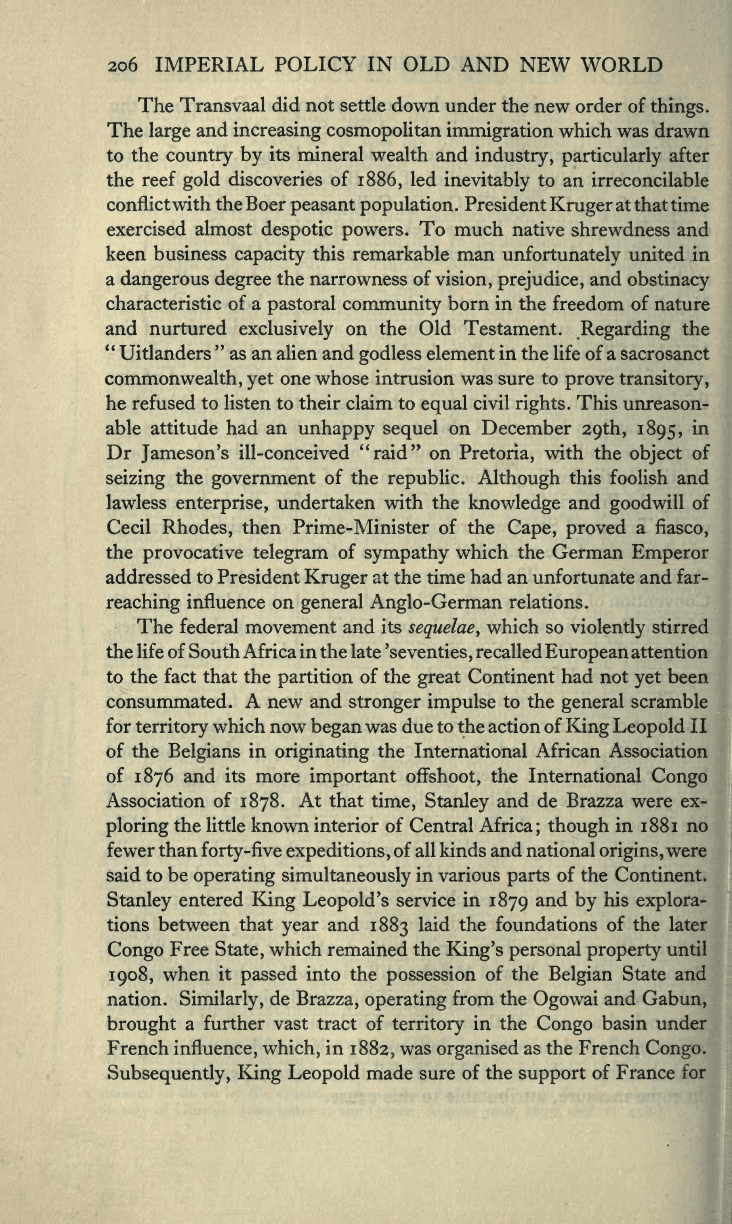
206 IMPERIAL
POLICY
IN
OLD
AND
NEW WORLD
The
Transvaal
did
not
settle down
under
the
new
order of
things.
The
large
and
increasing cosmopolitan
immigration
which was drawn
to
the
country by
its mineral
wealth and
industry,
particularly
after
the
reef
gold
discoveries
of
1886,
led
inevitably
to an irreconcilable
conflictwith
theBoer
peasant
population.
President
Kruger
at
that
time
exercised
almost
despotic powers.
To much
native shrewdness and
keen
business
capacity
this
remarkable man
unfortunately
united
in
a
dangerous
degree
the narrowness of
vision,
prejudice,
and
obstinacy
characteristic
of
a
pastoral
community
born in
the freedom of nature
and nurtured
exclusively
on
the
Old
Testament.
Regarding
the
"
Uitlanders
"
as an alien and
godless
element
in
the life
of
a sacrosanct
commonwealth,
yet
one whose
intrusion was sure
to
prove
transitory,
he refused
to
listen to their claim to
equal
civil
rights.
This unreason-
able attitude had
an
unhappy sequel
on
December
29th,
1895,
in
Dr
Jameson's
ill-conceived
"raid" on
Pretoria,
with
the
object
of
seizing
the
government
of
the
republic.
Although
this foolish
and
lawless
enterprise,
undertaken with the
knowledge
and
goodwill
of
Cecil
Rhodes,
then Prime-Minister of the
Cape, proved
a
fiasco,
the
provocative telegram
of
sympathy
which the German
Emperor
addressed to President
Kruger
at
the time had an
unfortunate
and far-
reaching
influence on
general
Anglo-German
relations.
The federal movement
and its
sequelae,
which so
violently
stirred
the life
of
South
Africa in the
late 'seventies
,
recalled
European
attention
to the
fact that
the
partition
of
the
great
Continent
had
not
yet
been
consummated. A
new
and
stronger
impulse
to
the
general
scramble
for
territory
which
now
began
was
due
to the action of
King
Leopold
II
of the
Belgians
in
originating
the International
African
Association
of
1876
and its more
important
offshoot,
the International
Congo
Association of
1878.
At that
time,
Stanley
and de Brazza
were ex-
ploring
the little known
interior of Central
Africa;
though
in 1881 no
fewer
than
forty-five
expeditions,
of
all kinds and national
origins,
were
said to be
operating
simultaneously
in
various
parts
of
the
Continent.
Stanley
entered
King Leopold's
service
in
1879
an<^
by
his
explora-
tions between
that
year
and
1883
laid the
foundations of
the later
Congo
Free
State,
which
remained the
King's personal
property
until
1908,
when
it
passed
into
the
possession
of the
Belgian
State
and
nation.
Similarly,
de
Brazza,
operating
from the
Ogowai
and
Gabun,
brought
a further
vast tract
of
territory
in the
Congo
basin under
French
influence, which,
in
1882,
was
organised
as
the French
Congo.
Subsequently,
King Leopold
made sure
of the
support
of France
for
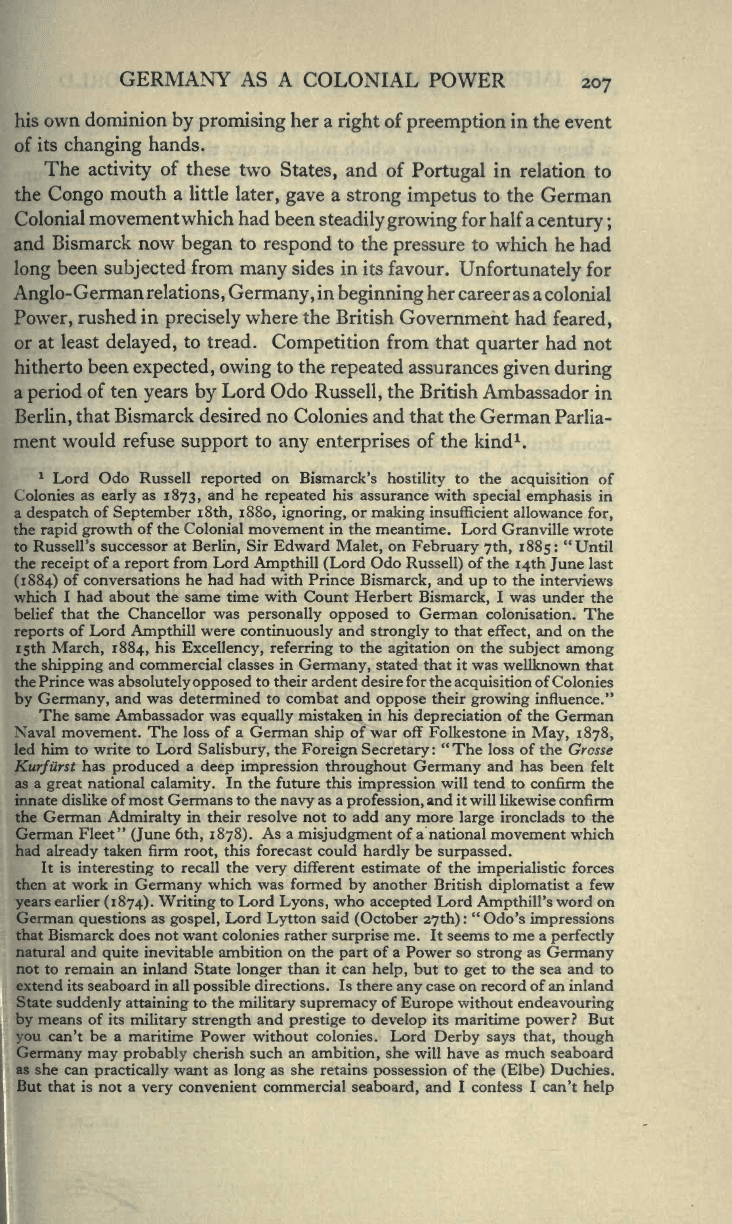
GERMANY
AS A
COLONIAL POWER
207
his
own
dominion
by
promising
her a
right
of
preemption
in
the
event
of
its
changing
hands.
The
activity
of
these
two
States,
and of
Portugal
in
relation
to
the
Congo
mouth
a
little
later,
gave
a
strong impetus
to
the German
Colonial
movementwhich
had
been
steadily
growing
for half
a
century
;
and
Bismarck now
began
to
respond
to the
pressure
to
which he
had
long
been
subjected
from
many
sides in its
favour.
Unfortunately
for
Anglo-
German
relations,
Germany
,
in
beginning
her
career
as
a
colonial
Power,
rushed in
precisely
where
the British
Government
had
feared,
or
at least
delayed,
to tread.
Competition
from that
quarter
had
not
hitherto
been
expected,
owing
to
the
repeated
assurances
given
during
a
period
of
ten
years by
Lord
Odo
Russell,
the
British
Ambassador
in
Berlin,
that
Bismarck
desired
no
Colonies
and that
the
German
Parlia-
ment
would refuse
support
to
any enterprises
of
the
kind
1
.
1
Lord Odo Russell
reported
on
Bismarck's
hostility
to the
acquisition
of
Colonies
as
early
as
1873,
and he
repeated
his
assurance with
special
emphasis
in
a
despatch
of
September
18th, 1880,
ignoring,
or
making
insufficient
allowance
for,
the
rapid
growth
of the Colonial
movement
in the
meantime. Lord Granville
wrote
to Russell's
successor at
Berlin,
Sir Edward
Malet,
on
February 7th,
1885:
"Until
the
receipt
of
a
report
from Lord
Amp
thill
(Lord
Odo
Russell)
of
the
14th
June
last
(1884)
of conversations
he had had
with Prince
Bismarck,
and
up
to the
interviews
which
I had about the
same
time
with
Count Herbert
Bismarck,
I
was
under
the
belief
that the Chancellor was
personally opposed
to German
colonisation.
The
reports
of Lord
Ampthill
were
continuously
and
strongly
to
that
effect,
and on
the
15th
March,
1884,
his
Excellency, referring
to
the
agitation
on the
subject
among
the
shipping
and commercial classes in
Germany,
stated that it was
wellknown
that
the
Prince was
absolutely opposed
to their
ardent
desire for
the
acquisition
of Colonies
by
Germany,
and was
determined
to
combat and
oppose
their
growing
influence."
The same Ambassador
was
equally
mistaken
in
his
depreciation
of the
German
Naval movement.
The loss of
a
German
ship
of
war
off Folkestone
in
May,
1878,
led
him
to
write to Lord
Salisbury,
the
Foreign Secretary:
"The loss of the
Grcsse
Kurfiirst
has
produced
a
deep impression
throughout Germany
and has
been felt
as
a
great
national
calamity.
In the future this
impression
will tend
to confirm
the
innate dislike
of
most Germans
to
the
navy
as a
profession,
and
it
will
likewise confirm
the German
Admiralty
in their resolve not to add
any
more
large
ironclads to the
German Fleet"
(June
6th,
1878).
As a
misjudgment
of
a
national
movement which
had
already
taken firm
root,
this
forecast
could
hardly
be
surpassed.
It
is
interesting
to
recall
the
very
different estimate of
the
imperialistic
forces
then at work in
Germany
which was formed
by
another British
diplomatist
a
few
years
earlier
(1874).
Writing
to
Lord
Lyons,
who
accepted
Lord
Ampthill's
word on
German
questions
as
gospel,
Lord
Lytton
said
(October
27th):
"Odo's
impressions
that
Bismarck does
not want
colonies rather
surprise
me. It seems to me a
perfectly
natural
and
quite
inevitable ambition
on the
part
of
a
Power
so
strong
as
Germany
not to
remain
an inland
State
longer
than it
can
help,
but to
get
to
the sea
and
to
extend
its seaboard in all
possible
directions.
Is
there
any
case on record
of an inland
State
suddenly attaining
to the
military
supremacy
of
Europe
without
endeavouring
by
means
of its
military strength
and
prestige
to
develop
its
maritime
power
?
But
you
can't be
a
maritime Power without
colonies.
Lord
Derby
says
that,
though
Germany
may probably
cherish such
an
ambition,
she
will
have as much seaboard
as
she can
practically
want
as
long
as she
retains
possession
of
the
(Elbe)
Duchies.
But
that
is
not
a
very
convenient
commercial
seaboard,
and I confess I can't
help
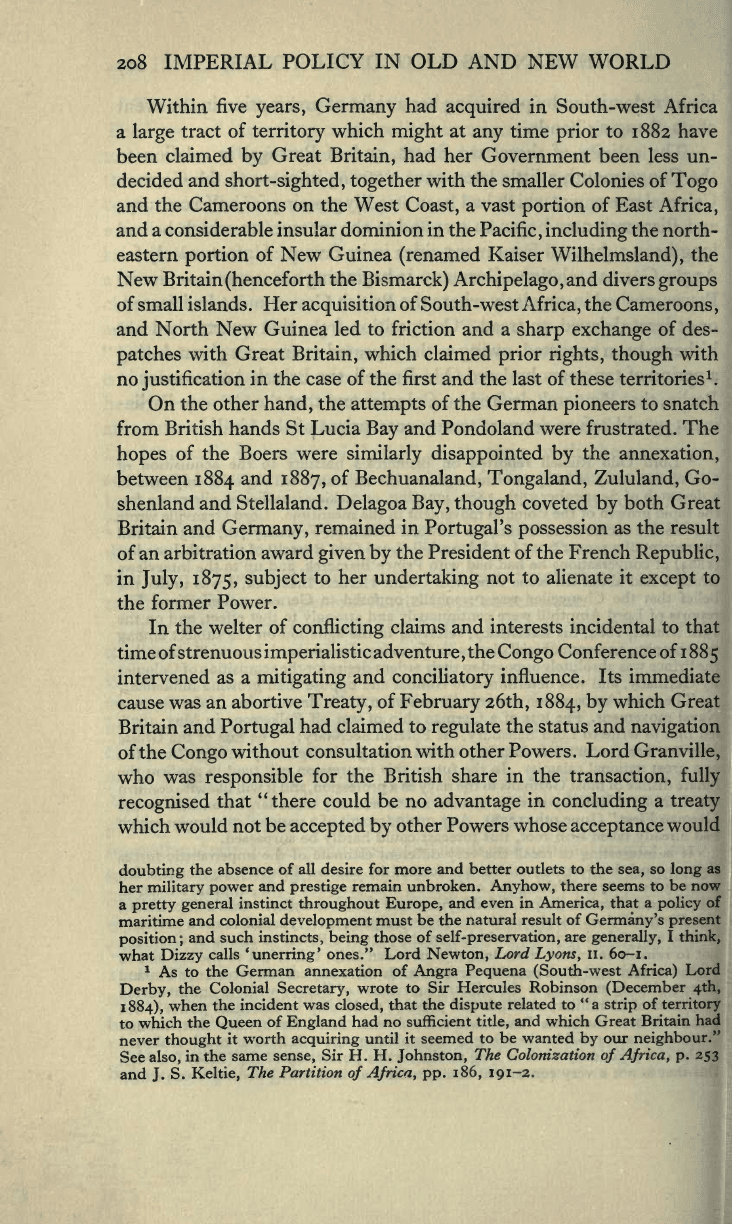
208 IMPERIAL
POLICY
IN
OLD
AND NEW WORLD
Within
five
years,
Germany
had
acquired
in
South-west Africa
a
large
tract of
territory
which
might
at
any
time
prior
to
1882
have
been
claimed
by
Great
Britain,
had her
Government been less un-
decided
and
short-sighted, together
with the
smaller Colonies
of
Togo
and
the Cameroons
on the
West
Coast,
a vast
portion
of
East
Africa,
and
a
considerable insular dominion in the
Pacific,
including
the north-
eastern
portion
of
New
Guinea
(renamed
Kaiser
Wilhelmsland),
the
New
Britain
(henceforth
the
Bismarck) Archipelago,
and divers
groups
of small
islands. Her
acquisition
of
South-west
Africa,
the
Cameroons,
and
North
New
Guinea
led to friction and a
sharp exchange
of des-
patches
with Great
Britain,
which claimed
prior rights, though
with
no
justification
in the case of the
first
and the
last
of these territories
1
.
On the
other
hand,
the
attempts
of
the German
pioneers
to snatch
from
British hands
St
Lucia
Bay
and
Pondoland were frustrated.
The
hopes
of
the Boers were
similarly
disappointed by
the
annexation,
between
1884
and
1887,
of
Bechuanaland,
Tongaland,
Zululand,
Go-
shenland
and Stellaland.
Delagoa
Bay, though
coveted
by
both Great
Britain
and
Germany,
remained
in
Portugal's possession
as the result
of
an
arbitration award
given
by
the
President
of
the
French
Republic,
in
July,
1875, subject
to
her
undertaking
not to alienate
it
except
to
the
former
Power.
In the welter
of
conflicting
claims and
interests incidental
to
that
time
ofstrenuous
imperialistic
ad
venture,
the
Congo
Conference of
1
885
intervened
as a
mitigating
and
conciliatory
influence.
Its immediate
cause
was
an abortive
Treaty,
of
February
26th,
1884,
by
which
Great
Britain
and
Portugal
had claimed to
regulate
the status and
navigation
of
the
Congo
without
consultation with other Powers.
Lord
Granville,
who
was
responsible
for
the
British
share
in the
transaction,
fully
recognised
that
"
there could be
no
advantage
in
concluding
a
treaty
which
would
not
be
accepted
by
other Powers whose
acceptance
would
doubting
the
absence of
all desire for more
and better outlets to the
sea,
so
long
as
her
military power
and
prestige
remain unbroken.
Anyhow,
there
seems
to
be
now
a
pretty
general
instinct
throughout
Europe,
and
even in
America,
that
a
policy
of
maritime
and colonial
development
must
be the
natural result
of
Germany's
present
position;
and
such
instincts,
being
those
of
self-preservation,
are
generally,
I
think,
what
Dizzy
calls
'unerring'
ones." Lord
Newton,
Lord
Lyons,
II.
60-1.
1
As to
the
German annexation
of
Angra Pequena
(South-west
Africa)
Lord
Derby,
the
Colonial
Secretary,
wrote
to Sir
Hercules Robinson
(December
4th,
1884),
when
the
incident
was
closed,
that
the
dispute
related to
"
a
strip
of
territory
to
which
the
Queen
of
England
had no sufficient
title,
and
which Great
Britain
had
never
thought
it
worth
acquiring
until
it seemed
to be
wanted
by
our
neighbour."
See
also,
in the
same
sense,
Sir H.
H.
Johnston,
The Colonization
of
Africa,
p.
253
and
J.
S.
Keltie,
The
Partition
of
Africa, pp.
186, 191-2.
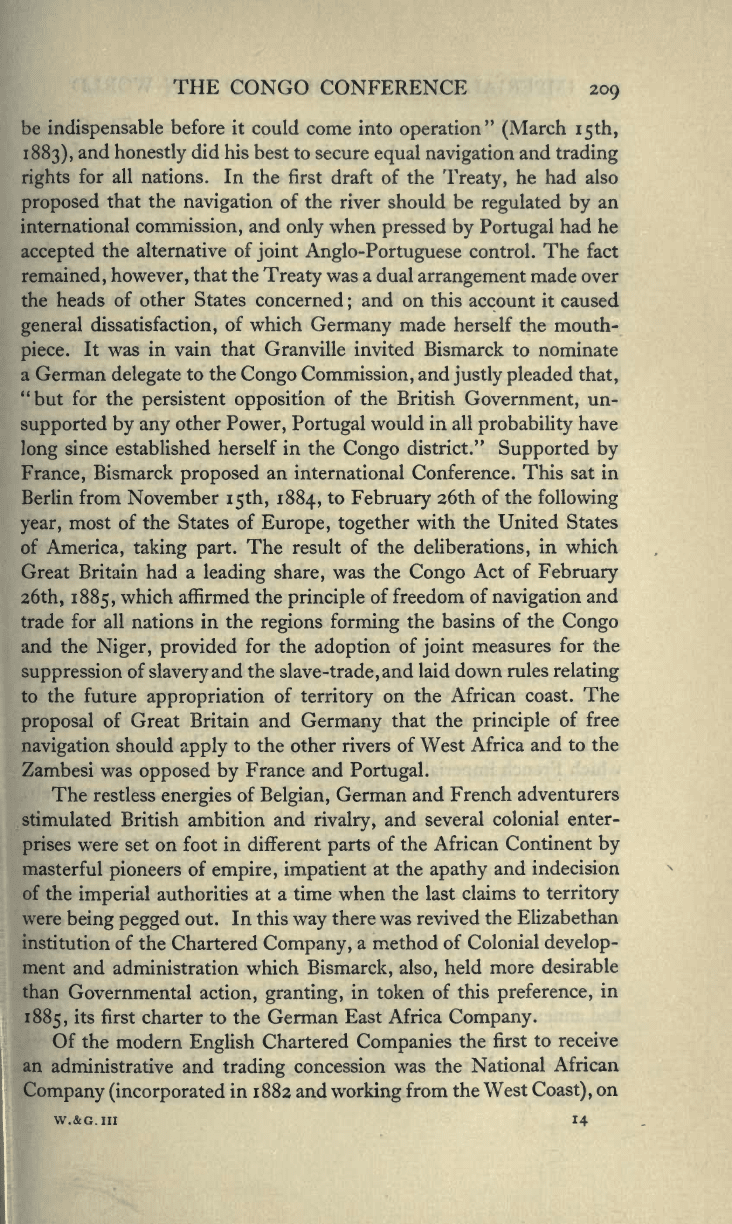
THE
CONGO
CONFERENCE
209
be
indispensable
before it
could
come
into
operation" (March 15th,
1883),
and
honestly
did his
best to
secure
equal navigation
and
trading
rights
for
all
nations.
In
the
first
draft
of the
Treaty,
he
had also
proposed
that the
navigation
of the
river should be
regulated by
an
international
commission,
and
only
when
pressed
by Portugal
had he
accepted
the alternative of
joint
Anglo-Portuguese
control. The
fact
remained,
however,
that
the
Treaty
was
a dual
arrangement
made over
the heads
of other States
concerned
;
and on this
account it caused
general
dissatisfaction,
of which
Germany
made herself
the mouth-
piece.
It
was in vain
that
Granville invited
Bismarck to
nominate
a German
delegate
to the
Congo
Commission,
and
justly
pleaded
that,
"but for the
persistent
opposition
of
the British
Government,
un-
supported
by
any
other
Power,
Portugal
would in all
probability
have
long
since established herself
in the
Congo
district."
Supported
by
France,
Bismarck
proposed
an
international Conference. This
sat
in
Berlin from November
15th,
1884,
to
February
26th of
the
following
year,
most of the
States of
Europe, together
with
the
United
States
of
America,
taking part.
The result of
the
deliberations,
in which
Great Britain had
a
leading
share,
was the
Congo
Act of
February
26th,
1885,
which affirmed the
principle
of freedom
of
navigation
and
trade for all nations in the
regions
forming
the
basins of the
Congo
and
the
Niger, provided
for the
adoption
of
joint
measures
for the
suppression
of
slavery
and the
slave-trade,
and laid down
rules
relating
to
the future
appropriation
of
territory
on
the
African coast.
The
proposal
of Great Britain and
Germany
that the
principle
of free
navigation
should
apply
to the
other
rivers of West
Africa
and to the
Zambesi
was
opposed
by
France and
Portugal.
The
restless
energies
of
Belgian,
German
and
French adventurers
stimulated British ambition
and
rivalry,
and
several
colonial enter-
prises
were set on
foot
in different
parts
of the
African Continent
by
masterful
pioneers
of
empire,
impatient
at the
apathy
and
indecision
of
the
imperial
authorities at
a time when
the
last
claims
to
territory
were
being pegged
out. In
this
way
there
was
revived
the
Elizabethan
institution of
the Chartered
Company,
a
method
of Colonial
develop-
ment
and
administration
which
Bismarck,
also,
held
more
desirable
than
Governmental
action,
granting,
in
token
of
this
preference,
in
1885,
i
ts
fi
rst
charter to the
German
East Africa
Company.
Of
the modern
English
Chartered
Companies
the
first
to receive
an
administrative
and
trading
concession
was
the
National
African
Company (incorporated
in
1882
and
working
from
the
West
Coast),
on
W.&G.III
14
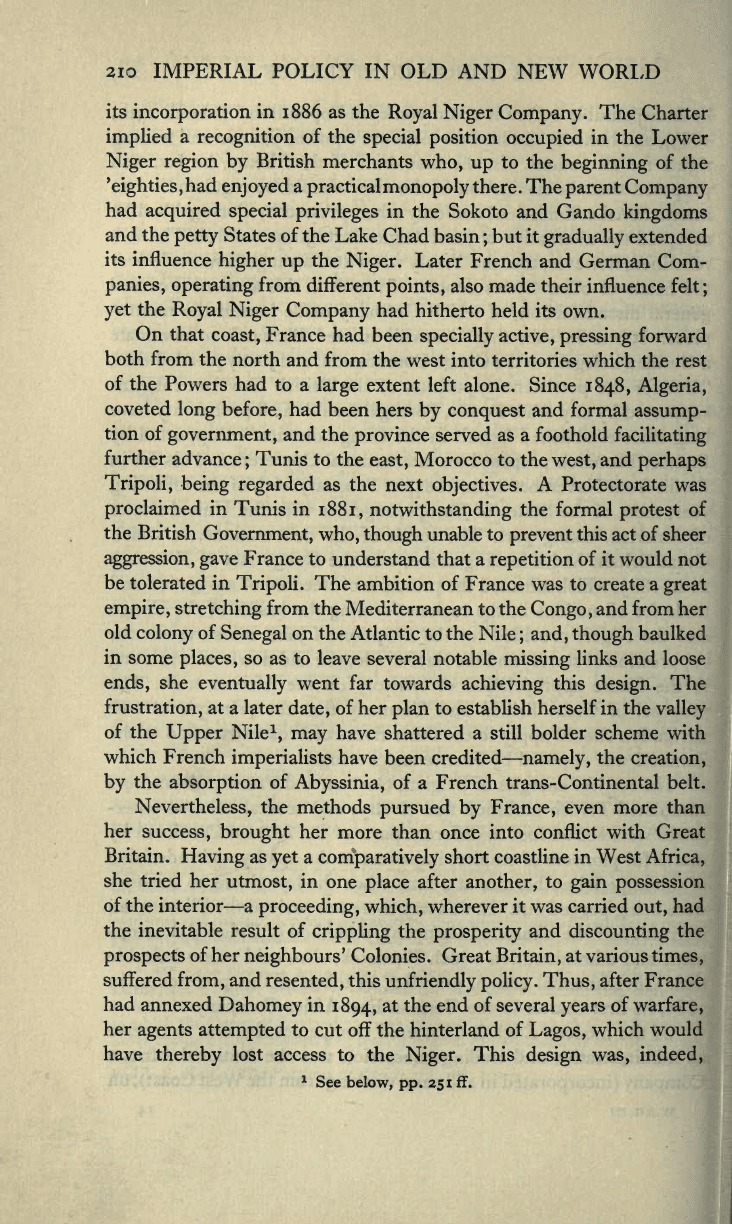
2io
IMPERIAL POLICY IN OLD
AND NEW
WORLD
its
incorporation
in
1886 as
the
Royal Niger
Company.
The
Charter
implied
a
recognition
of
the
special
position
occupied
in
the
Lower
Niger
region
by
British
merchants
who,
up
to
the
beginning
of
the
'eighties,
had
enjoyed
a
practical
monopoly
there.
The
parent
Company
had
acquired special
privileges
in
the Sokoto and
Gando
kingdoms
and
the
petty
States of
the
Lake Chad basin
;
but it
gradually
extended
its
influence
higher
up
the
Niger.
Later French and
German Com-
panies,
operating
from
different
points,
also made
their influence
felt;
yet
the
Royal Niger
Company
had
hitherto held
its
own.
On that
coast,
France had
been
specially
active,
pressing
forward
both
from
the north
and
from
the west into territories
which the rest
of
the
Powers had
to a
large
extent left
alone. Since
1848,
Algeria,
coveted
long
before,
had
been hers
by
conquest
and formal
assump-
tion
of
government,
and
the
province
served as
a
foothold
facilitating
further
advance
;
Tunis to
the
east,
Morocco to the
west,
and
perhaps
Tripoli,
being regarded
as the next
objectives.
A
Protectorate was
proclaimed
in
Tunis in
1881,
notwithstanding
the formal
protest
of
the
British
Government,
who,
though
unable to
prevent
this act of
sheer
aggression,
gave
France to
understand
that
a
repetition
of it would not
be
tolerated in
Tripoli.
The ambition of
France
was to
create
a
great
empire,
stretching
from
the Mediterranean to the
Congo,
and from her
old
colony
of
Senegal
on
the Atlantic to the Nile
;
and,
though
baulked
in
some
places,
so as to
leave
several notable
missing
links and
loose
ends,
she
eventually
went far
towards
achieving
this
design.
The
frustration,
at a
later
date,
of her
plan
to establish herself in the
valley
of the
Upper
Nile
1
,
may
have
shattered
a
still
bolder
scheme witl
which
French
imperialists
have been
credited
—
namely,
the creatioi
by
the
absorption
of
Abyssinia,
of a French trans-Continental
belt
Nevertheless,
the
methods
pursued
by
France,
even
more
th;
her
success,
brought
her
more
than once into conflict with
Gres
Britain.
Having
as
yet
a
comparatively
short coastline
in
West
Africs
she tried
her
utmost,
in
one
place
after
another,
to
gain
possessioi
of
the
interior
—
a
proceeding,
which,
wherever
it
was carried
out,
hac
the
inevitable result
of
crippling
the
prosperity
and
discounting
th<
prospects
of
her
neighbours'
Colonies.
Great
Britain,
at various times
suffered
from,
and
resented,
this
unfriendly
policy.
Thus,
after
France
had
annexed
Dahomey
in
1894,
at the end
of
several
years
of
warfare,
her
agents attempted
to
cut
off the
hinterland of
Lagos,
which
woulc
have
thereby
lost access to
the
Niger.
This
design
was,
indeec
1
See
below,
pp.
251
ff.
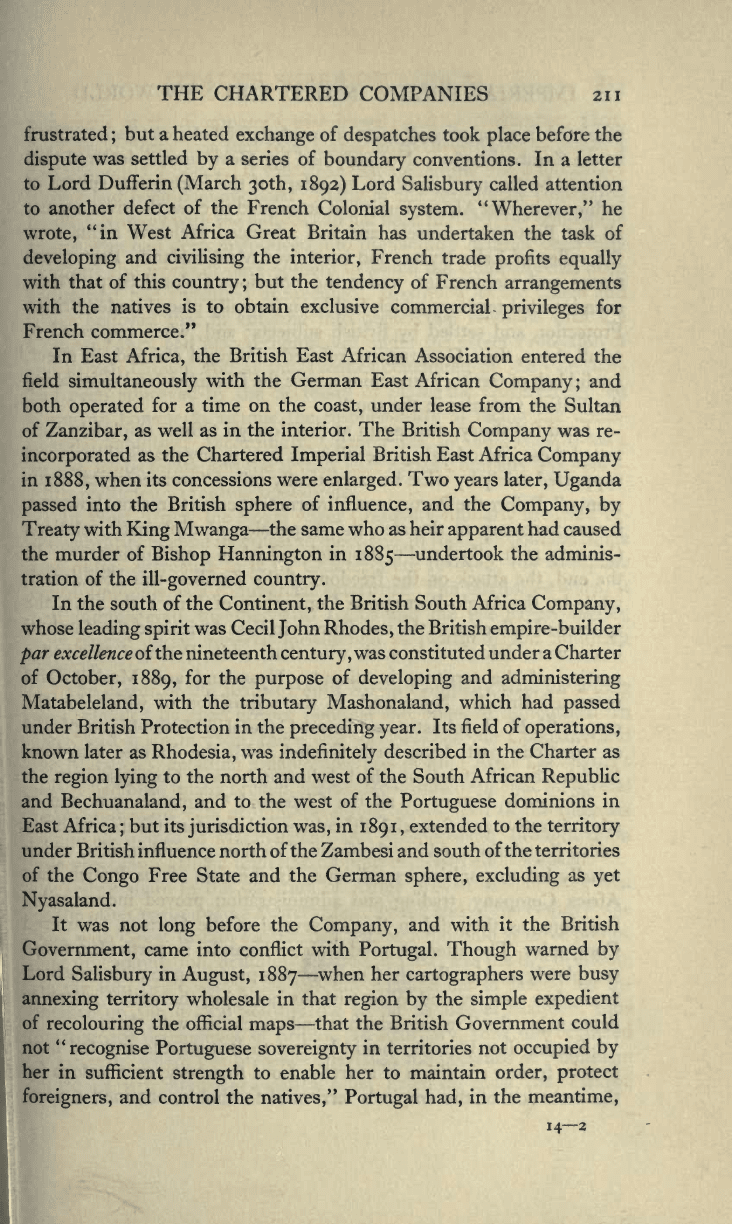
THE
CHARTERED
COMPANIES
211
frustrated
;
but a
heated
exchange
of
despatches
took
place
before the
dispute
was
settled
by
a
series of
boundary
conventions.
In a letter
to
Lord Dufferin
(March 30th,
1892)
Lord
Salisbury
called attention
to another
defect
of
the French
Colonial
system.
"Wherever,"
he
wrote,
"in West
Africa
Great
Britain has
undertaken
the
task of
developing
and
civilising
the
interior,
French
trade
profits
equally
with
that of
this
country
;
but
the
tendency
of
French
arrangements
with the
natives
is to
obtain
exclusive
commercial
privileges
for
French commerce."
In East
Africa,
the
British East
African
Association
entered
the
field
simultaneously
with the German East
African
Company
;
and
both
operated
for
a time
on
the
coast,
under lease
from the
Sultan
of
Zanzibar,
as well
as in
the
interior. The
British
Company
was
re-
incorporated
as the Chartered
Imperial
British East
Africa
Company
in
1888,
when
its concessions
were
enlarged.
Two
years
later,
Uganda
passed
into
the
British
sphere
of
influence,
and
the
Company,
by
Treaty
with
King
Mwanga
—
the same who
as
heir
apparent
had caused
the
murder
of
Bishop Hannington
in
1885
—
undertook
the
adminis-
tration of the
ill-governed
country.
In the south of the
Continent,
the British South
Africa
Company,
whose
leading
spirit
was Cecil
John
Rhodes,
the
British
empire-builder
par
excellence of
the nineteenth
century
,
was constituted under
a Charter
of
October,
1889,
for the
purpose
of
developing
and
administering
Matabeleland,
with
the
tributary
Mashonaland,
which
had
passed
under British
Protection
in
the
preceding
year.
Its field
of
operations,
known
later as
Rhodesia,
was
indefinitely
described
in the Charter
as
the
region
lying
to the north and west of the South
African
Republic
and
Bechuanaland,
and to the west of the
Portuguese
dominions
in
East
Africa;
but its
jurisdiction
was,
in
189
1,
extended
to the
territory
under
British influence north of the Zambesi
and south ofthe
territories
of the
Congo
Free
State and the German
sphere,
excluding
as
yet
Nyasaland.
It
was not
long
before
the
Company,
and with
it
the
British
Government,
came
into conflict
with
Portugal.
Though
warned
by
Lord
Salisbury
in
August,
1887
—
when her
cartographers
were
busy
annexing
territory
wholesale
in that
region
by
the
simple
expedient
of
recolouring
the official
maps
—
that
the
British Government
could
not
"recognise
Portuguese sovereignty
in
territories
not
occupied by
her
in
sufficient
strength
to enable
her to
maintain
order,
protect
foreigners,
and
control the
natives,"
Portugal
had,
in
the
meantime,
14—2
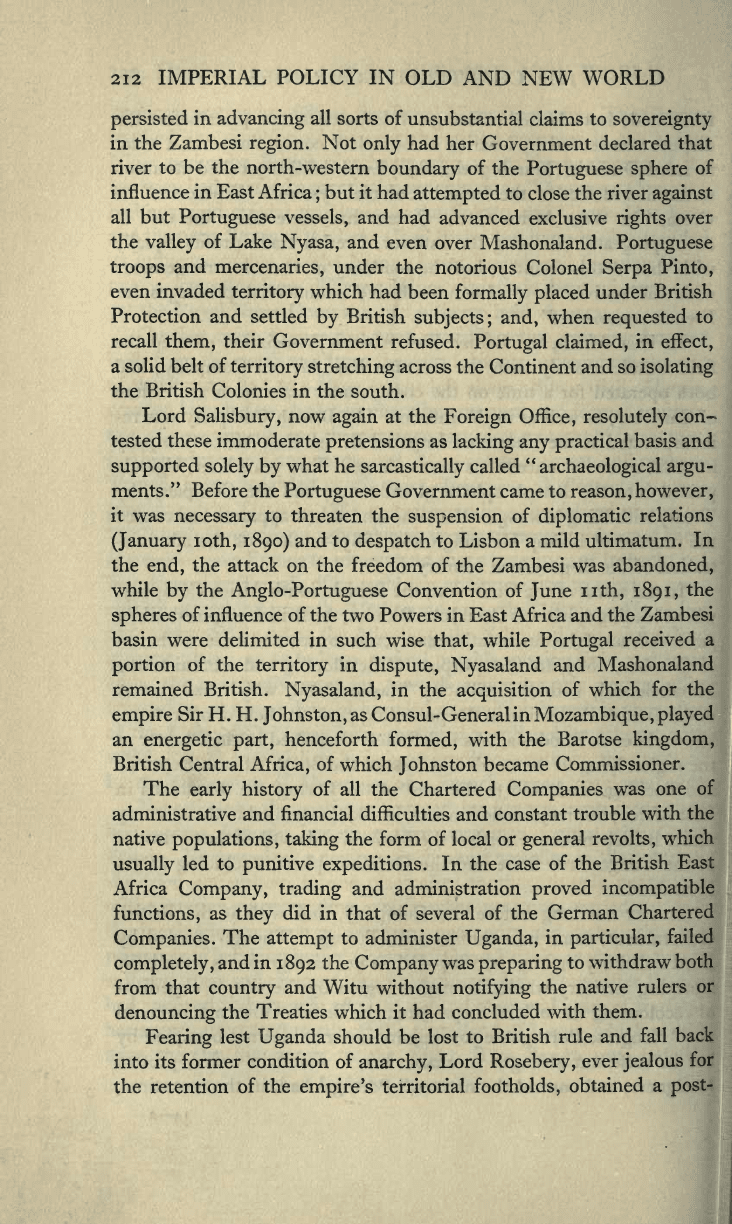
212
IMPERIAL
POLICY
IN
OLD
AND
NEW
WORLD
persisted
in
advancing
all
sorts of
unsubstantial
claims
to
sovereignty
in the
Zambesi
region.
Not
only
had
her
Government
declared
that
river
to
be the
north-western
boundary
of the
Portuguese
sphere
of
influence
in
East
Africa
;
but it
had
attempted
to close
the
river
against
all
but
Portuguese
vessels,
and
had
advanced exclusive
rights
over
the
valley
of
Lake
Nyasa,
and
even
over Mashonaland.
Portuguese
troops
and
mercenaries,
under
the
notorious Colonel
Serpa
Pinto,
even invaded
territory
which had
been
formally
placed
under
British
Protection and
settled
by
British
subjects;
and,
when
requested
to
recall
them,
their
Government
refused.
Portugal
claimed,
in
effect,
a
solid belt of
territory stretching
across
the Continent
and
so
isolating
the
British
Colonies in
the south.
Lord
Salisbury,
now
again
at
the
Foreign
Office,
resolutely
con-
tested these
immoderate
pretensions
as
lacking
any
practical
basis and
supported
solely
by
what he
sarcastically
called
"
archaeological
argu-
ments."
Before the
Portuguese
Government came
to
reason,
however,
it
was
necessary
to
threaten
the
suspension
of
diplomatic
relations
(January
ioth,
1890)
and
to
despatch
to
Lisbon
a
mild ultimatum.
In
the
end,
the attack
on the freedom of
the Zambesi was
abandoned,
while
by
the
Anglo-Portuguese
Convention
of
June
nth,
1891,
the
spheres
of
influence of
the two Powers in East Africa
and the
Zambesi
basin
were delimited
in
such
wise
that,
while
Portugal
received
a
portion
of the
territory
in
dispute,
Nyasaland
and
Mashonaland
remained British.
Nyasaland,
in
the
acquisition
of
which
for the
empire
Sir H. H.
Johnston,
as
Consul-Generalin
Mozambique,
played
an
energetic part,
henceforth
formed,
with the
Barotse
kingdom,
British
Central
Africa,
of
which
Johnston
became
Commissioner.
The
early history
of all
the Chartered
Companies
was
one
of
administrative
and financial
difficulties and constant
trouble
with
the
native
populations, taking
the form
of
local or
general
revolts,
which
usually
led to
punitive
expeditions.
In
the
case of
the
British
East
Africa
Company, trading
and administration
proved
incompatible
functions,
as
they
did
in
that
of several of
the German
Chartered
Companies.
The
attempt
to administer
Uganda,
in
particular,
failed
completely,
and
in
1892
the
Company
was
preparing
to withdraw
both
from
that
country
and
Witu
without
notifying
the
native
rulers
or
denouncing
the
Treaties which
it
had
concluded
with
them.
Fearing
lest
Uganda
should be
lost
to British
rule
and
fall
back
into its
former
condition of
anarchy,
Lord
Rosebery,
ever
jealous
for
the
retention
of the
empire's
territorial
footholds,
obtained
a
post-

ITALY'S
SHARE
OF AFRICA
213
ponement
of
the
Company's
withdrawal;
and in
November,
1893,
Sir
Gerald
Portal
was
sent from
Zanzibar to
investigate
the
position
and
propound
a
policy.
It
was
clear
that
something
like a
moonlight
flitting
had been
contemplated.
Many
of
the
agreements
contracted
by
the
Company
with
the
natives
had
not been
fulfilled
;
the Soudanese
troops
who
had been
introduced
into the
country
had
not been
duly
paid
off;
and
works of
development
to which
the
Company
had
been
committed
had remained
unexecuted.
Inasmuch as
the chiefs and
tribes believed
that
in
entering
into contractual
relations with
the
Company they
had
placed
themselves
under the
direct
Protection of
the
British
Crown,
and as the
Treaties
concluded
by
the
Company
had been
approved by
the
Secretary
of
State,
the
Government
felt
bound in honour to assume the
responsibility
of
facing
the undis-
charged
liabilities.
Accordingly,
Uganda
was,
in
1894,
constituted a
British
Protectorate,
and
the
British
East Africa
Company
was
hence-
forth restricted
to
trading
operations.
In West
Africa,
the
Royal
Niger
Company
similarly
incurred re-
sponsibilities beyond
its
power
to
meet, and,
in
1900,
the
political
rights
and duties entrusted to
it
by
Charter were
revoked,
the
Company
continuing only
as a
commercial
enterprise.
The territories
which
it
had
administered,
together
with
Lagos
and the Oil Rivers
region,
now
passed
under
imperial
jurisdiction
as Northern and Southern
Nigeria.
The career of the British South
Africa
Company
was,
for
a
long
time,
clouded
by
even
greater political
and financial
difficulties. In
1893,
and
again
in
1896,
there was
war between
the
Company
and
the
Matabeles,
entailing
a
deplorable
loss
of
life. After
Lobengula's
power
had been
finally
broken,
rebellion continued
endemic for several
years,
and
many
acts of dubious
equity, prejudicial
to the interests
of the
aborigines
of Matabeleland and
Mashonaland,
brought upon
this
great
imperialistic undertaking
both criticism
and
reproach.
Italy's
share in the
partition
of Africa
proved
smaller
than
that
of
the other
participating
Powers; but,
by
the end of the
century,
she
had,
with Great Britain's
assistance,
gained
a foothold
at three
points.
Her
first
acquisition,
definitely
secured in
1882,
was the
bay
of
Assab,
on the
Red
Sea
coast,
which
speedily
enabled her
to
extend
her in-
fluence on the littoral
southwards so
far
as
Bab-el-Mandeb,
thus
creating
the
dependency
of Eritrea.
In
February,
1885,
she
occupied
Massowah,
where her
presence
alleviated the
pressure
of
Mahdiism
in
the
Eastern Soudan
at
a critical
time.
From
the
coast,
Italy essayed
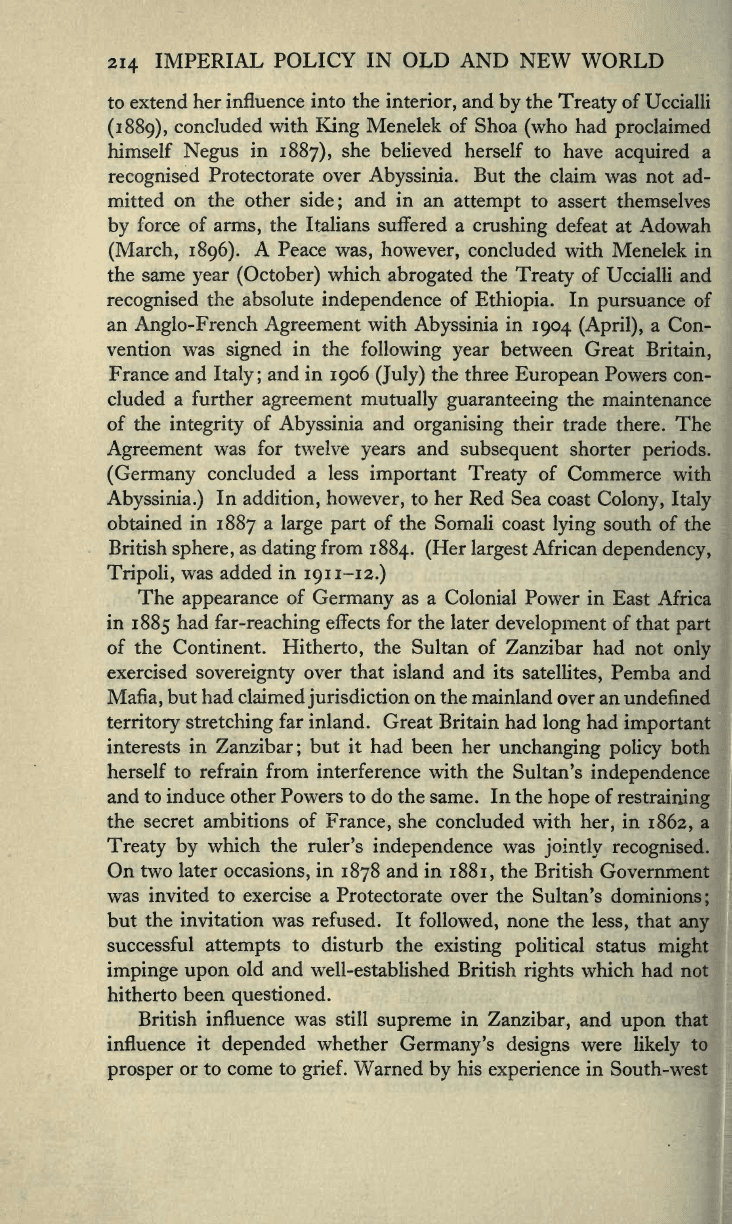
2i
4
IMPERIAL
POLICY
IN
OLD AND
NEW
WORLD
to
extend
her
influence
into the
interior,
and
by
the
Treaty
of
Uccialli
(1889),
concluded
with
King
Menelek
of
Shoa
(who
had
proclaimed
himself
Negus
in
1887),
she
believed herself
to
have
acquired
a
recognised
Protectorate
over
Abyssinia.
But the
claim
was
not ad-
mitted
on
the other
side;
and in
an
attempt
to
assert
themselves
by
force
of
arms,
the Italians suffered
a
crushing
defeat
at
Adowah
(March, 1896).
A
Peace
was, however,
concluded
with Menelek in
the same
year
(October)
which
abrogated
the
Treaty
of Uccialli and
recognised
the absolute
independence
of
Ethiopia.
In
pursuance
of
an
Anglo-French
Agreement
with
Abyssinia
in
1904 (April),
a
Con-
vention was
signed
in
the
following year
between
Great
Britain,
France and
Italy;
and in
1906
(July)
the
three
European
Powers con-
cluded a
further
agreement
mutually
guaranteeing
the
maintenance
of the
integrity
of
Abyssinia
and
organising
their
trade there.
The
Agreement
was for
twelve
years
and
subsequent
shorter
periods.
(Germany
concluded a less
important
Treaty
of
Commerce with
Abyssinia.)
In
addition, however,
to
her
Red
Sea
coast
Colony, Italy
obtained
in
1887
a
large
part
of
the
Somali
coast
lying
south
of
the
British
sphere,
as
dating
from
1884. (Her
largest
African
dependency,
Tripoli,
was added
in
1911-12.)
The
appearance
of
Germany
as a Colonial
Power
in
East Africa
in
1885
had
far-reaching
effects for
the
later
development
of
that
part
of the
Continent.
Hitherto,
the Sultan of
Zanzibar
had
not
only
exercised
sovereignty
over that island
and its
satellites,
Pemba and
Mafia,
but
had
claimed
jurisdiction
on
the mainland
over an
undefined
territory
stretching
far inland.
Great Britain
had
long
had
important
interests
in
Zanzibar;
but it
had been
her
unchanging
policy
both
herself
to
refrain
from
interference with
the
Sultan's
independence
and
to
induce other Powers to do the
same. In the
hope
of
restraining
the secret
ambitions
of
France,
she
concluded with
her,
in
1862,
a
Treaty
by
which the ruler's
independence
was
jointly
recognised.
On
two later
occasions,
in
1878
and in
1881,
the British
Government
was
invited
to
exercise a
Protectorate
over the Sultan's
dominions;
but the
invitation was
refused. It
followed,
none the
less,
that
any
successful
attempts
to
disturb the
existing political
status
might
impinge
upon
old and
well-established
British
rights
which
had
not
hitherto been
questioned.
British
influence was still
supreme
in
Zanzibar,
and
upon
that
influence
it
depended
whether
Germany's
designs
were
likely
to
prosper
or to come to
grief.
Warned
by
his
experience
in
South-west
